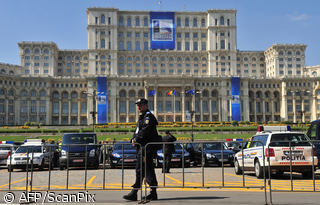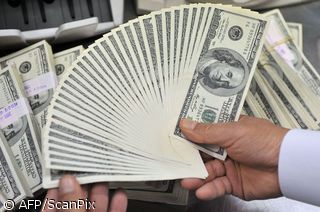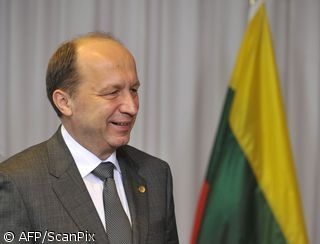The Russian Gas monopoly Gazprom intends to take action in order to force The Ukraine to pay for gas and stop the country from exporting it to Europe.
Published:
7 July 2000 y., Friday
Russian deputy Prime Minister Viktor Khristenko has reported that gas deals between the two CIS members are to be radically revised and a new payment procedure is to be introduced soon. By October 1st this year, the Russian government will have prepared a set of documents regulating gas transactions between the two states. Judging from the published excerpts from those documents, Russia will no longer tolerate The Ukraine’s non-payment and gas theft.
Firstly, to stop gas deliveries through The Ukraine would mean loosing lucrative contracts with Germany. Secondly, Kiev has cunningly managed to use Gazprom’s and the Russian authorities’ interests to suit its own ends, by promising the Kremlin that The Ukraine could delay its bid to enter NATO. The Russian authorities willingly bought these promises.
Politics aside, there were also economic reasons for Russia’s lenience towards The Ukraine. Gazprom has always acted as a private legal entity, although the Russian government holds a 41% stake in the gas giant. However, Gazprom continuously delayed tax payments, omitted dividends, and state representatives were given a disproportionately low share of the seats on Gazprom’s board of directors.
The government therefore did not take great pains to defend Gazprom’s interests.
Russia also insists that The Ukraine should stop illicit gas deliveries to Europe. The problem is that The Ukraine purchases Russian gas on favorable terms, regularly delays payments to Gazprom and then resells gas at high European prices, thus disrupting the stability of European gas supplies.
Šaltinis:
Internet
Copying, publishing, announcing any information from the News.lt portal without written permission of News.lt editorial office is prohibited.
The most popular articles
 The EBRD is supporting the modernisation of transport infrastructure in Serbia with a €150 million sovereign loan to finalise the construction of a new motorway section along the strategic Corridor X.
more »
The EBRD is supporting the modernisation of transport infrastructure in Serbia with a €150 million sovereign loan to finalise the construction of a new motorway section along the strategic Corridor X.
more »
 The Executive Board of the International Monetary Fund (IMF) today completed the first review of Romania’s economic performance under a program supported by a 24-month Stand-By Arrangement (SBA).
more »
The Executive Board of the International Monetary Fund (IMF) today completed the first review of Romania’s economic performance under a program supported by a 24-month Stand-By Arrangement (SBA).
more »
 The Executive Board of the International Monetary Fund (IMF) today approved a three-year, SDR 13.57 million (about US$21.5 million) arrangement under the Poverty Reduction and Growth Facility (PRGF) for the Union of the Comoros.
more »
The Executive Board of the International Monetary Fund (IMF) today approved a three-year, SDR 13.57 million (about US$21.5 million) arrangement under the Poverty Reduction and Growth Facility (PRGF) for the Union of the Comoros.
more »
 The Executive Board of the International Monetary Fund (IMF) today completed the second review of Mongolia's economic performance under a program supported by an 18-month Stand-By Arrangement (SBA).
more »
The Executive Board of the International Monetary Fund (IMF) today completed the second review of Mongolia's economic performance under a program supported by an 18-month Stand-By Arrangement (SBA).
more »
 Parex banka has established a subsidiary, SIA NIF (“Nekustamo īpašumu fonds”, or “Real Estate Fund”), which will professionally manage assets that are not related to the Bank’s core business.
more »
Parex banka has established a subsidiary, SIA NIF (“Nekustamo īpašumu fonds”, or “Real Estate Fund”), which will professionally manage assets that are not related to the Bank’s core business.
more »
 In his address at the Lithuanian-Belarusian Business Forum “Belarus and Baltic States: new prospects for cooperation”, Prime Minister Andrius Kubilius has pointed out that Lithuania sees Belarus as creating its future in Europe...
more »
In his address at the Lithuanian-Belarusian Business Forum “Belarus and Baltic States: new prospects for cooperation”, Prime Minister Andrius Kubilius has pointed out that Lithuania sees Belarus as creating its future in Europe...
more »
 JDRF Employs VoIP and Web-Based Video Collaboration Enabled by Cisco for More Effective Teamwork Among Employees and Constituents.
more »
JDRF Employs VoIP and Web-Based Video Collaboration Enabled by Cisco for More Effective Teamwork Among Employees and Constituents.
more »
 On 16 September 2009, AB Bank SNORAS group finished the transaction during which it purchased from AB “Invalda” with its own funds 100 per cent of the shares of AB “Finasta įmonių finansai”, managing AB Bank “Finasta”.
more »
On 16 September 2009, AB Bank SNORAS group finished the transaction during which it purchased from AB “Invalda” with its own funds 100 per cent of the shares of AB “Finasta įmonių finansai”, managing AB Bank “Finasta”.
more »
 Federal Reserve Chairman Ben Bernanke that the worst U.S. recession since the Great Depression was probably over, but the recovery will take time.
more »
Federal Reserve Chairman Ben Bernanke that the worst U.S. recession since the Great Depression was probably over, but the recovery will take time.
more »
 Growth expected to return in the second half of 2009. Forecasts are still uncertain but fears of a severe, prolonged recession are fading.
more »
Growth expected to return in the second half of 2009. Forecasts are still uncertain but fears of a severe, prolonged recession are fading.
more »